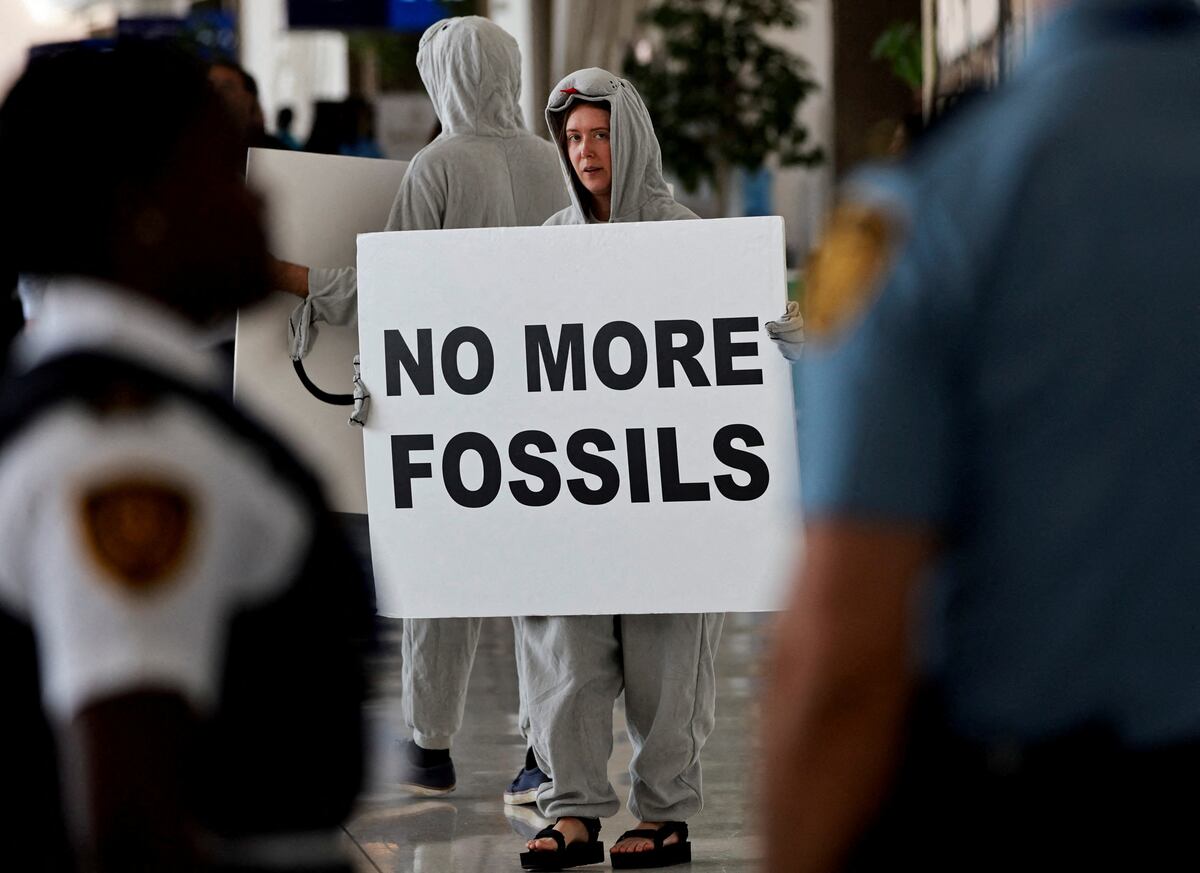After a long night of negotiations in Dubai, the climate summit held in this city in the United Arab Emirates emerged with a proposal for a new agreement in which references to fossil fuels would be tightened and clarified after the harsh criticism sparked by the draft launched on Monday by the COP28 presidency. The team of UAE Industry Minister Sultan Al Jaber is trying to find language on ending or reducing fossil fuels that can be supported by representatives of the nearly 200 countries present at this conference.
Finally, the agreement proposal launched on Wednesday in stoppage time (the summit was supposed to end yesterday) proposes a transition — a “transition away from,” is the English expression used — to leave fossil fuels behind “in energy systems, in a fair way.” “. in an orderly and equitable manner, and accelerate the adoption of measures in this critical decade, in order to achieve net zero by 2050.
Countries must now analyze this latest proposal. The presidency intends to hold a plenary session during the morning to approve it. If this signal remains at the end or moves towards the end of fossil fuels, it will be the first time something like this has been achieved, because it points directly to oil, gas and coal.
Some petro-states fought hard at COP28 to avoid referring to all fuels. While another important bloc, comprising about a hundred countries, wanted clear language against those mainly responsible for the greenhouse emissions that are warming the planet. The European Union, which has been active in this last position, will evaluate the text this morning, but this Wednesday the faces were satisfied with this latest proposal.
This call against fossil fuels comes in the context of new climate plans that countries must submit in 2025 to continue reducing their emissions. In the energy part of the text, which is the most interesting, all countries are also asked to “contribute” through other measures, such as the next global effort to “triple the world’s renewable energy capacity and double the global annual rate.” to improve energy efficiency by 2030” and “accelerate efforts to phase out coal power” that does not have systems to capture emissions.
In addition, these measures include phasing out “inefficient fossil fuel subsidies,” although no dates have been set. It is also committed to “substantially reducing non-CO2 emissions globally, including in particular methane emissions by 2030”, although no specific target has been set either.
Information is the first tool to combat climate change. Subscribe to it.
Participate
The agreement leaves several doors open for the fossil fuel sector, which felt threatened at this summit but has succeeded over decades in ensuring that these climate agreements talk about greenhouse gas emissions in general but not about their causes, namely fossil fuels. There is reference to the use of “neutral or low-carbon fuels before or around mid-century.” Among the technologies to be accelerated, in addition to renewable and nuclear energy sources, they point to “reduction and removal technologies, such as carbon capture, use and storage, especially in sectors that are difficult to reduce, and hydrogen production with low carbon emissions.”
Finally, the need to “accelerate the reduction of emissions from road transport”, “with infrastructure and rapid deployment of zero-emission and low-emission vehicles”, was also mentioned.
If this text goes ahead, it will represent a clear signal of what countries signatory to the Paris Agreement should include in their next climate plans, which must be submitted in 2025 and which must work to ensure that temperature rises remain between 1.5 and 2 degrees Celsius. degrees Celsius compared to pre-industrial levels. This is the level of safety proposed by the Paris Agreement. However, the current plans that countries have covering up to 2030 will lead to temperatures rising, in the best-case scenario, between 2.1 and 2.8 degrees, as recognized in the text presented by the Summit Presidency. That’s why they need to be tightened and given these guidelines that clearly put fossil fuels in the spotlight for the first time.
Melanie Robinson, of the World Resources Institute, said the first reactions of some activists and analysts to the text highlighted that the proposal “sends a clear call for the world to divest from fossil fuels and accelerate action in this decade.” “This text would significantly move the needle in the fight against climate change and overcome enormous pressure from oil and gas interests.”
WWF’s Stephen Cornelius added: “This draft is a much-needed improvement on the last version, which rightly caused outrage. “The language around fossil fuels has improved a lot, but it still stops short of calling for the complete elimination of coal, oil and gas.” He added: “If countries agree to this text, it will be an important moment. This member of the environmental NGO WWF added: “For decades, UN climate talks have not addressed which fuels are causing the climate crisis.”
You can follow the climate and environment at Facebook And sor sign up here to receive Our weekly newsletter

“Unapologetic tv specialist. Hardcore zombie trailblazer. Infuriatingly humble problem solver.”

:quality(85)/cloudfront-us-east-1.images.arcpublishing.com/infobae/7GTZZ3YRERFV7J75VEPMTMDSHU.jpg)



:quality(85)/cloudfront-us-east-1.images.arcpublishing.com/infobae/TPKDIBIMCFGHVFKHL54I4F4ICM.jpg)

More Stories
Venezuela condemned the Israeli bombing of the city of Rafah
The Lebanese resistance bombs an Israeli base in the occupied Golan (+ photo)
José Raul Molino leads the vote for the President of Panama